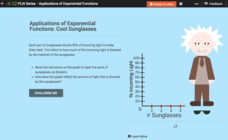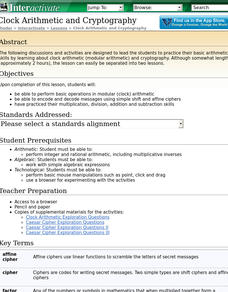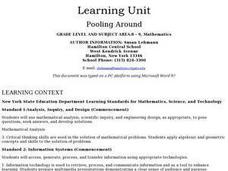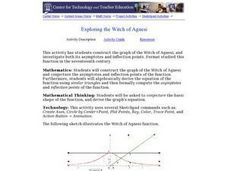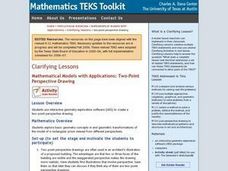Curated OER
Decode Word Is..
Students solve problems using patterns. In this algebra lesson, students identify the relation, domain and range of a function. They graph functions using coordinate pairs.
Curated OER
The Binary Counter Circuit
Learners count from 0-99 using the binary number system. In this algebra lesson, students problem solve by working with faulty circuits and applying their knowledge f Binary Numbers. They work in team to create a solution.
Curated OER
When Am I Ever Going to Use this?
Students solve problems using equations and properties of integers. In this algebra lesson, students solve problems using ratio and proportion and graph their answers on a coordinate plane. They solve word problems using geometry.
Curated OER
Tune...Um!
Students collect real data on sound. For this algebra lesson, students use a CBL and graphing calculator to observe the graph created by sound waves. They draw conclusion about the frequency of sound from the graph.
Illustrative Mathematics
Cell Phone Plans
Turn your classroom into a local cell phone store. Then, have your cell phone agents use linear equations to visually display three cell plans and their advantages. It makes for a great group project. Discuss how to decide which plan is...
CK-12 Foundation
Quadratic Functions and Equations
The form of a quadratic function paints a picture of its graph. Young mathematicians explore this connection by locating key features on a graph and then writing the corresponding equations. The interactive tutorial highlights key...
CK-12 Foundation
Exponential Decay: Cool Sunglasses
Who wouldn't want to wear four pairs of sunglasses? Each pair of sunglasses reduces the percent of incoming light by one-half. An interactive tutorial helps young mathematicians build a graph that models this scenario. They then explore...
Curated OER
My Foot and the Standard Foot
Young mathematicians put one foot in front of the other as they learn how to measure length in an elementary math lesson. Using paper cutouts of their own feet, children measure classroom objects as they discover the importance of...
Curated OER
Introduction to Linear Functions
Students are introduced to the basic ideas needed for understanding linear functions.
Curated OER
Clock Arithmetic and Cryptography
Learners investigate modular clock arithmetic and cryptography. They perform basic operations in modular (clock) arithmetic and encode and decode messages using simple shift and affine ciphers.
Curated OER
Hardy-Weinberg Equilibrium According to Hoyle: OR, Population Genetics or Platypapyrus foursuitii
Students use this exercise to help achieve a working knowledge of the Hardy-Weinberg Equilibrium without recourse to algebra. After participating in this activity, students gain a feeling for the significance of the Hardy-Weinberg...
Curated OER
Hardy-Weinberg Equilibrium According to Hoyle:
Learners gain a feeling for the significance of the Hardy-Weinberg Equilibrium without using algebra but participating in an interactice game.
Curated OER
Equations, Expressions, Factorization
Students graph and solve equations and expressions. For this algebra lesson, students use simple factorization to simplify expressions. They review for an exam by doing basic algebra.
Curated OER
Clock Arithmetic and Cryptography
Young scholars perform basic operations in modular (clock) arithmetic. Students encode and decode messages using shift and affine ciphers. Young scholars apply their multiplication, division, addition, and subtraction skills.
Curated OER
An Introduction to Measuring Theory
Students investigate one, two and three dimensional objects. For this algebra lesson, students differentiate between different shapes of objects and write equations to represent each. They start with what they already know and prove...
Curated OER
Introducing Trigonometry
Eleventh graders explore the three basic trigonometric functions. In this trigonometry/Algebra II lesson, 11th graders use GeoGebra and the unit circle to define the ratios of sides is a right triangles as they examine the full domain...
Curated OER
Pooling Around
Young scholars complete a unit of lessons on computing area and volume. They play a Jeopardy game of basic area formulas, calculate surface area of shapes, develop a Powerpoint presentation, and conduct a simulation of finding the...
Curated OER
Exploring the Witch of Agnesi
young scholars construct the graph of the Witch of Agnesi, and investigate both its asymptotes and inflection points. They construct the graph of the Witch of Agnesi and conjecture the asymptotes and inflection points of the function. ...
Curated OER
Logarithms #4
For this Algebra II/Pre-Calculus worksheet, students solve problems that involve the applications of logs and exponentials. The eight page worksheet contains seventeen problems. Answers are not provided.
Curated OER
Properties of Operations
Eighth graders use the order of operation correctly. In this algebra lesson, 8th graders solve integers using the order of operation. They apply the commutative as well as the associate property to solve problems correctly.
Curated OER
Mathematical Models with Applications: Two-Point Perspective Drawing
Young scholars use interactive geometry exploration software (GES) to create a two-point perspective drawing. They explore basic geometry concepts in and geometric transformations of the model of a rectangular prism viewed from different...
Curated OER
Innovation in a Bag
Students create a business plan to start up their own business. In this algebra lesson, students think of a product they can produce and sell. They create on paper what they should do and then put into practice creating a mock business.
Curated OER
Probability: Ratios and Percents
Students investigate ratios and percents. In this algebra instructional activity, students explore the probability of an event occurring. They convert between ratios and percents as they solve the odds.
Curated OER
Cups and Cubes
Third graders explore the use of cups and counters as a model to analyze the effects of operations. They create and use a rule to create a sequential pattern and use cups and cubes to model the relationship.








